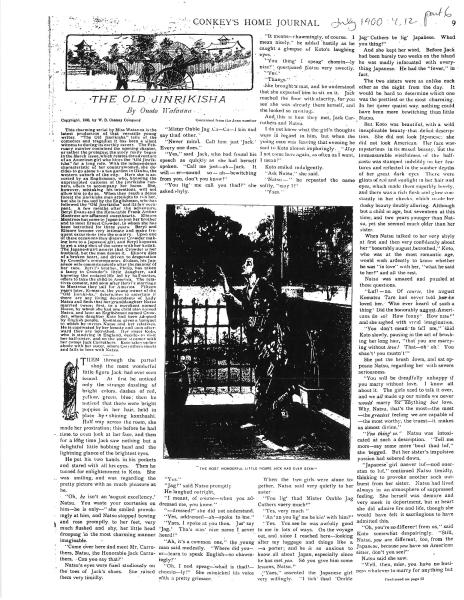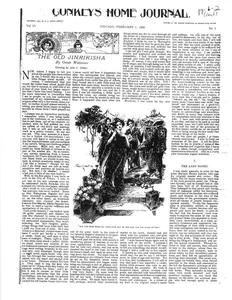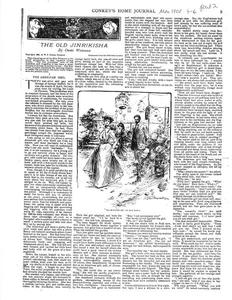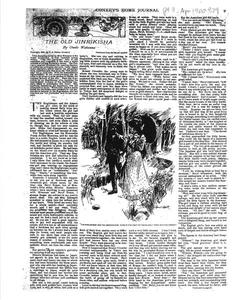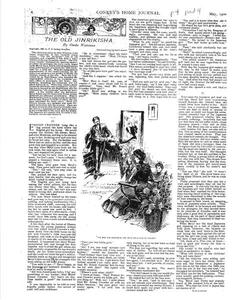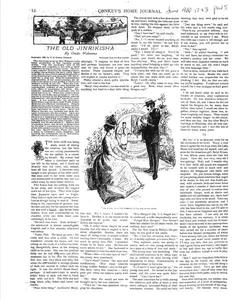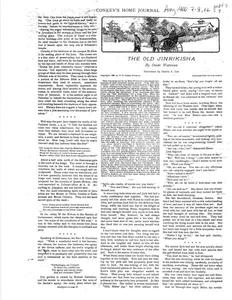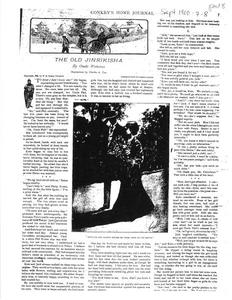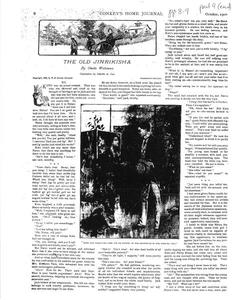VII. (continued)
Then through the parted
shoji the most wonderful little figure Jack had ever seen issued. At first he noticed only the strange dazzling of bright colors, dashes of red, yellow, green, blue; and he noticed that there were bright poppies in her hair, held in place by shining
kanzhashi .
1 Half way across the room, she made her prostration; this before he had time to even look at her face, and then for a long time Jack saw nothing but a delightful little bobbing head and the lightning glance of the brightest eyes.
He put his two hands in his pockets and stared with all his eyes. Then he turned for enlightenment to Koto. She was smiling, and was regarding the pretty picture with as much pleasure as he.
“Oh, he isn’t an ‘august excellency,’, Natsu. You waste your courtesies on him—-he is only—-” she smiled provokingly at him, and Natsu stopped bowing and rose promptly to her feet, very much flushed and shy, her little head drooping in the most charming manner imaginable.
“Come over here and meet Mr. Carruthers, Natsu, the Honorable Jack Carruthers. Can you say that?”
Natsu’s eyes were fixed studiously on the toes of Jack’s shoes. She raised them very timidly.
“Mister Onble Jag Ca—-Ca—-I kin nod say thad other.”
“Never mind. Call him just ‘Jack.’ Every one does.”
“Yes,” said Jack, who had found his speech as quickly as she had herself spoken. “Call me just-—ah—-Jack. It will--er—-sound so—-ah—-bewitching from you, don’t you know?”
“You lig’ me call you thad?” she asked shyly.
“Yes.”
“Jag!” said Natsu promptly.
He laughed outright.
“I meant, of course—-when you addressed me, you know.”
“—-dressed?” she did not understand.
“Yes, addressed—-ah—-spoke to me.”
“Yaes, I spoke at you then. Jus’ say ‘Jag.’ Tha’s mos’ nize name I aever heard!”
“Ah, it’s a common one,” the young man said modestly. “Where did you—-er-—learn to speak English-—so chawmingly?”
“Oh, I nod speag—-whad is thad?—-chomin—-ly!” She mimicked his voice with a pretty grimace.
“It means—-chawmingly, of course. I mean, nicely,” he added hastily as he caught a glimpse of Koto’s laughing eyes.
“You thing’ I speag’ chomin—-ly nize?” questioned Natsu very sweetly.
“Yes.”
“Thangs.”
She brought a mat, and he understood that she expected him to sit on it. Jack reached the floor with alacrity, for you see she was already there herself, and she looked so inviting.
And this is how they met, Jack Carruthers and Natsu.
I do not know what the girl’s thoughts were in regard to him, but when the young man was leaving that evening he said to Koto almost imploringly. “May I not come here again, as often as I want, I mean?”
Koto smiled indulgently.
“Ask Natsu,” she said.
“Natsu—-” he repeated the name softly, “may I?”
“Yaes.”
When the two girls were alone together, Natsu said very quietly to her sister:
“You lig’ thad Mister Omble Jag Cuthers vaery much?”
“Yes, very much.”
“Aa! an you lig’ me be kin’ with him?”
“Yes. You see he was awfully good to me in lots of ways. On the voyage out, and since I reached here—-looking after my luggage and things like a—-a porter; and he is so anxious to know all about Japan, especially since he has met you. So you give him some lessons, Natsu.”
“Yaes,” assented the Japanese girl very willingly. “I tich’ thad Omble Jag Cuthers be lig’ Japanese. Whad you thing?”
And she kept her word. Before Jack had been barely two weeks on the island he was madly infatuated with everything Japanese. He had the “fever,” in fact.
The two sisters were as unlike each other as the night from the day. It would be hard to determine which one was the prettiest or the most charming. In her queer quaint way, nothing could have been more bewitching than little Natsu.
But Koto was beautiful, with a wild, inexplicable beauty that defied description. She did not look Japanese; she did not look American. Her face was mysterious in its mixed beauty, but the immeasurable wistfulness of the half-caste was stamped indelibly on her features and reflected in the somber depths of her great, dark eyes. There were glints of red and sunlight in her hair and eyes, which made them superbly lovely, and there was a rich flush and glow constantly in her cheeks, which made her dusky beauty doubly alluring. Although but a child in age, but seventeen at this time, and two years younger than Natsu, yet she seemed much older than her sister.
When Natsu talked to her very shyly at first and then very confidently about her “honorably august betrothed,” Koto, who was at the most romantic age, would wish ardently to know whether he was “in love” with her, “what he said to her?” and all the rest.
Natsu was amazed and puzzled at these questions.
“Luf?—-no. Of course, the august Komatsu Taro had never told her he loved her. Who ever heard of such a thing! Did the honorably august Americans do so? How fonny! How nize!” and she sighed with vivid imagination.
“You don’t mean to tell me,” said Koto slowly, pausing in the act of brushing her long hair, “that you are marrying without love! That—-oh! oh! You shan’t! you mustn’t!”
She put the brush down, and sat opposite Natsu, regarding her with severe seriousness.
“You will be dreadfully unhappy if you marry without love. I know all about it. The girls used to talk it over, and we all made up our minds we never would marry for anything but love. Why, Natsu, that’s the most-—the most—- the greatest feeling we are capable of—-the most worthy, the truest—-it makes us almost divine.”
“You thing’ so.” Natsu was intoxicated at such a description. “Tell me more—-say some more ‘bout thad luf,” she begged. But her sister’s impulsive passion had sobered down.
“Japanese girl naever luf—-nod onerstan to luf,” continued Natsu timidly, thinking to provoke another such outburst from her sister. Natsu had lived always in an atmosphere of suppressed feeling. She herself was demure and very meek in deportment, but at heart she did admire fire and life, though she would have felt it sacrilegious to have admitted this.
“Oh, you’re so different from us,” said Koto somewhat despairingly. “Still, Natsu, you are different, too, from the Japanese, because you have an American sister, don’t you see?”
Natsu said she saw.
“Well, then, miss, you have no business whatever to marry for anything 12 but love, you understand? And I won’t—-no, I’ll refuse to give my consent to any union save for that reason.”
Koto really felt very much concerned about her sister, and lay awake the entire night thinking the matter over.
“And to think I was so glad at the idea of her marrying. I’m afraid that I can’t let a Japanese have her after all, though I did want her to marry one of them; still, they never love, she says, and Natsu shan’t go through life without being loved.”
Natsu remained awake, too, but her thoughts ran riot and were in great confusion. Hitherto the word “love” had not existed in her vocabulary at all. Her relatives, and, indeed, she herself had come to believe that a marriage with Komatsu Taro would mean the acme of bliss. But here was her clever and beautiful worldly sister, whom Natsu had always looked up to in a vague sort of way, without knowing why she did so, telling her that it was a sin, a crime, to marry without love, and Natsu wished so much to be free of sin. And she had said, moreover, that she would be unhappy all the rest of her life if she did so. Natsu desired happiness above all else. Did she not pray to all the gods in the skies each morning to always lighten her life with this happiness, even though her august ancestors (relatives) had told her it was sinful? She had never known of any girl marrying for this love. She would find out more about it. Koto, she decided very shrewdly to herself, was biased in favor of this love, and, therefore, was incompetent to give advice. She would ask some one else. She did so. Next day she asked Carruthers, and he undertook, volunteered, in fact, to teach her the meaning of the word in all its phases. This, he said, would take time, and he expected her to be an attentive pupil.
Now all this time my dear master was in Yokohama, where he was attending to some important business. I had been made as a gift to Natsu, though I still continued to call him master to myself.
And so each day I was forced to be a witness to the “lessons” in love given Natsu by young Carruthers. He was a very clever, I might say extraordinary, teacher, and she so apt a pupil.
I believe the last lesson I saw him give her consisted of holding very close in his own her two little hands, and drawing them up to his lips, where he held them a long time, at the same time looking straight into the half-troubled, half-pleased eyes of the girl.
And afterward when he left her, she looked at the two silky little hands quite curiously.
“Tha’s mos fonny thing I never seed, thad luf,” she said.
Thus Komatsu Taro had found her. He stood in the doorway a long time, looking at the girl, and all his heart and soul were in his eyes. Talk of Japanese not loving! That’s all you foreigners know.
“What is it, ane-san?” (ane-san is the one endearing word in the Japanese language), he asked gently, taking the same small hands in his, and looking at them very tenderly.
“See,” she said, “he kissed them like this.” She brought them to her own lips.
“Who?” Komatsu did not understand. He thought perhaps she meant one of her honorable relatives.
“Why—-the Omble Jag Cuthers!”
“And who is he?” Komatsu had grown white, but his voice was sharp and stern in its brevity. It frightened Natsu. She had never heard him speak thus, nor frown so heavily on her.
“He—-” she faltered, trembling, “just big red-haired barbarian—-nice friend for me.”
“Ah! I understand,” said Komatsu, who had traveled much, and knew the world, “one of the brave foreigners from the west, who undertake to teach our women strange things. And so they have found you out also.”
“Yes,” admitted Natsu, who did not fully understand.
“And you—-you, Natsu, should have been proof against such people,” he said slowly, “for you are betrothed.”
“Ah—-ah—-” the girl was hesitating between a momentary fright and pettishness. She wished Komatsu Taro was not so cold. Why could he not teach her this fascinating “luf?”
“But I am not betrothed to you forever,” she said with bewilderment. “My sister tells me not to marry without this love.”
“And you do not love me, Natsu?” He was faltering now.
She opened her eyes wide, and stared at him, not comprehending.
“No—-o.”
“And you love this—-this foreigner—-the barbarian?”
“He tich’ me thad—-to onerstan’ thad luf.” She had lapsed into broken English.
Komatsu said never a word after that, but all the light of his life seemed to wither from his face.
When he met Koto he was stiffly polite, cold and frigidly formal and courteous. She could not decide whether to like him or not. Something somewhat wistful in his expression when he looked at Natsu touched and appealed to her; “but,” she told herself, “he is too cold to really love her. I must see that she, my own dear little sister, marries for love only.”
All the next day Komatsu stayed away from the house. Natsu was nervous and fretful. She talked constantly of her “august betrothed,” but she was impatient and angry with him for not coming.
Toward sunset Jack Carruthers came up the hill and coaxed her into going out with him for a little row on the bay. As they left the house and passed slowly down the river road together, Komatsu Taro knocked on the little door, and asked of her honorable relatives permission to see Natsu. They told him she had gone out on the bay with the foreign barbarian friend of her sister.
“And could he see the sister?”
“Yes, she was within. Would he deign to enter their miserable unworthy hovel?”
Komatsu addressed Koto entirely in English, in which language he conversed excellently, with the merest accent.
“Yesterday,” he said, “I had conversation with your sister.” He paused in order for her to acknowledge this. The girl stirred uneasily, wondering what it was he could have to say to her.
“Will you tell me why you do not wish her to marry with me, Miss Koto?”
“I—-I not want her to marry with you!” the girl blushed with shame. She felt sorry for him already. “Why, I—-”
“Yes, she told me.”
“Oh, I told her that she should not marry for anything but love, and,” firmly, “I meant that.”
“Yes, I understand. There is—-there was surely much love between us.”
“Oh, no! she said not herself.”
“She did not know it. The Japanese have no word for the emotion. That is all. Why do you suppose I would wish to marry with her, unless I—-”
“Oh!” Koto sprang quite excitedly to her feet. She was covered with contrition. “Then you do love her?”
“Forever,” he said fervently.
“Oh, oh! I am so glad,” she declared impulsively. “I did really want her to marry some nice Japanese, and you were so good to our ‘ancestors.’ It seemed a shame for her to marry without love, and I made up my mind I’d try and dissuade her from it.”
“Yes,” he was hesitating painfully. “Do—-you think she--your sister, has already love elsewhere?”
“I didn’t think of that;” the girl sat down again, and looked rather dejected. “He—-he has been with her so much lately, and—-”
“Yes, she told me.”
“She told you. Oh, isn’t she an innocent sweet little thing, though? Do—-do you really love her? Of course you do. No one could help themselves. Well, now I tell you what, I really want to help you. I would rather have you as brother- in-law than any one I know. Yes, I really would,” she continued, looking him up and down, “I like you. Now, here’s a bit of advice. Go to Natsu, and tell her that you love her. A woman likes to hear that, even a Japanese woman. Tell her that—-and—-and make love to her, if you can.”
“I will try,” Komatsu said seriously, and then he thanked the girl very earnestly.
When Jack Carruthers brought Natsu home it was past nine, and the spray was in her hair, and had dampened her hands and face. Her eyes were luminous, and yet half frightened. She had been hearing and seeing strange things, mayhap.
Koto took her into her arms, and quietly drew her down beside her.
“What did he say, Natsu?” she asked.
“He say thad—-thad I luf him.”
“Oh—h! and—-and do you?”
“I donno.”
